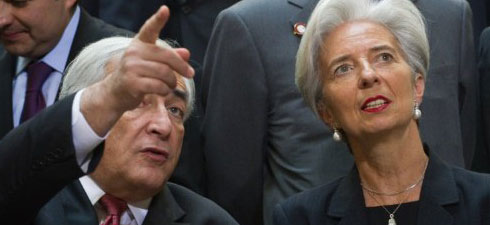With Dominique Strauss-Kahn out of the running, an extremely delicate chess game is underway to appoint his successor as managing director of the International Monetary Fund. Not that the man is irreplaceable. Despite the undoubted quality of his record and his expertise in dealing capably with crises, others equally qualified can take over the reins. The IMF, long dormant, has not stepped back into the job of fire-fighter of the world but for the sole grace of its managing director.
If Dominique Strauss-Kahn did find himself well placed at the centre of the game, it was also due to exceptional events, foremost among them the 2008 financial crisis and the crisis of the euro that ensued. Since that crisis continues to smoulder, we can easily understand the determination of Europeans in wanting to preserve at all costs the job for one of their own.
The bailout of Greece and the broader crisis of the single currency will occupy the days of the future boss of the IMF pretty well full time. The technical and financial assistance of the institution is vital in managing this complex assignment, which extends far beyond the strict confines of the Old Continent.
Contrary to the sweeping assertions of some arsonists, no one can measure the consequences of an implosion of the eurozone for the rest of the world economy. The situation demands a thorough knowledge of community mechanisms and a thorough understanding of the intricacies of local politics. To maintain that a European is better placed than an Asian or South American to address a subject so sensitive is no insult to anyone outside Europe. And it’s not giving away any secret to suggest that Christine Lagarde, who is familiar with the subject and many others that involve the IMF, has a resumé tailor-made for the job that is obvious to all.
The time will come when, as promised, a representative of an emerging country will accede to the highest offices. The globalisation of the economy and the ongoing upheaval in power relations justify this transition, which will involve all the same that some major powers like China cease their unilateral fixations and begin to care about the rest of the world. But for now, the fire has to be put out.
Translated from the French by Anton Baer
From Berlin
The German candidate is French
"Christine Lagarde, Germany's candidate," leadsHandelsblatt with a photo of a smiling French Minister of Finance. Such a choice would be a good one for Berlin, because “on the essential matters she is on the same wavelength as the German government." However, the economic daily writes, electing Lagarde to head the IMF "would be a defeat for Germany," because "the importance of a state is also measured by the number of its representatives holding down key international positions." Yet despite the fact that "Germany is by far the strongest economy in Europe, it is not currently occupying any," growls the Hamburg daily. As with the presidency of the European Commission or that of the ECB, Berlin renounced a German candidacy even though it had at least three candidates qualified to head the IMF, the newspaper observes with some criticism: Peer Steinbrück, the former finance minister, Josef Ackermann, head of Deutsche Bank or even Axel Weber, a former board member of the ECB.
Was this article useful? If so we are delighted!
It is freely available because we believe that the right to free and independent information is essential for democracy. But this right is not guaranteed forever, and independence comes at a cost. We need your support in order to continue publishing independent, multilingual news for all Europeans.
Discover our subscription offers and their exclusive benefits and become a member of our community now!












